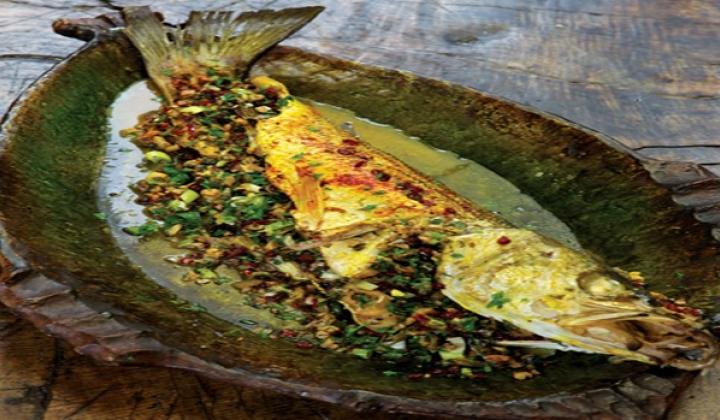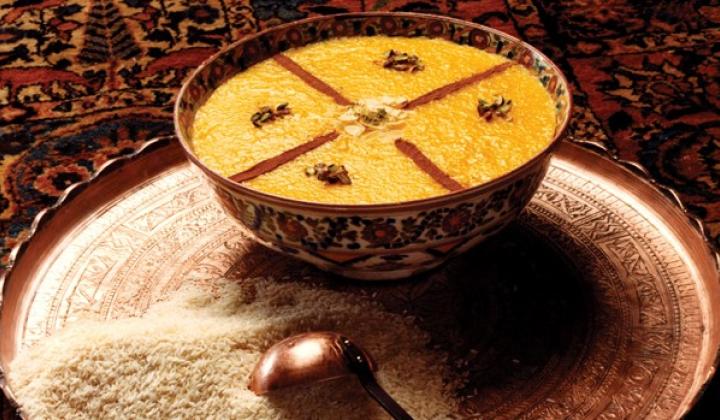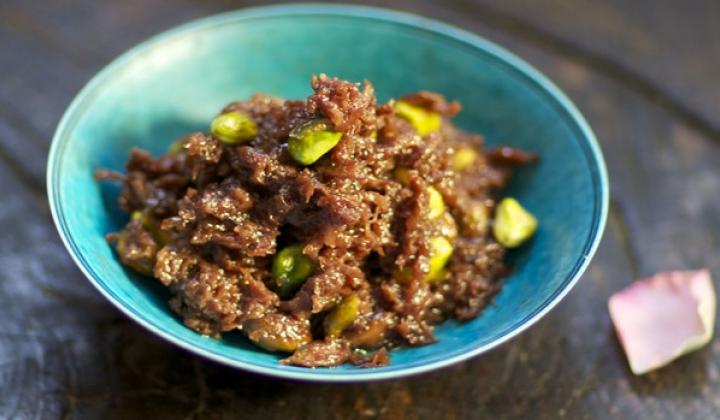Jeweled Rice
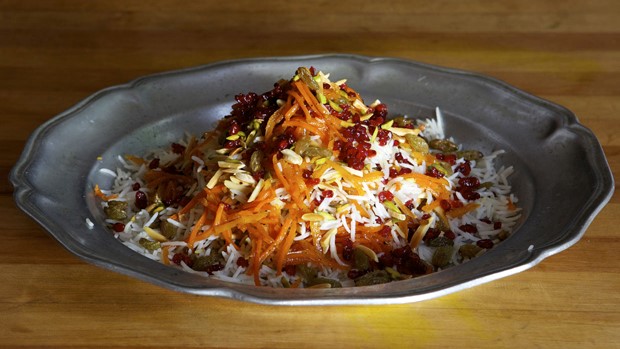
Yield
Ingredients
4 cups long-grain white basmati rice
1 cup dried barberries
1¼ cups oil, butter, or ghee*
½ cup unsalted almonds
½ cup raw pistachio kernels
½ cup seedless golden or green raisins
1 teaspoon ground saffron dissolved in ¼ cup orange blossom water
1 cup plus 2 tablespoons sugar
3 large oranges (1 cup slivered orange peel)
2–3 large carrots (2 cups peeled and cut 3-inch strips)
One 4-inch cinnamon stick
2 teaspoons cardamom powder
1 tablespoon orange blossom water
Instructions
Wash the rice by placing it in a large container and covering it with water. Agitate gently with your hand, then pour off the water. Repeat 5 times.
To soak the rice, cover with water, add 2 tablespoons salt and allow to soak for 2 to 24 hours (soaking, which is optional, results in longer grains of rice). Drain in a fine-mesh colander. Set aside.
Clean barberries by removing their stems and any grit. Place the barberries in a fine-mesh colander, and place the colander in a large container full of cold water. Allow barberries to soak for 20 minutes. Any sand will settle to the bottom. Take the colander out of the container and run cold water over the barberries. Drain and set aside.
Heat 1 tablespoon oil in a wide skillet over medium heat. Add the almonds and pistachios, stir-fry for 20 seconds. Add the raisins, remove from the skillet and set aside. In the same skillet, heat 2 tablespoons oil over medium heat, add the barberries, a few drops of saffron-orange blossom water, 2 tablespoons sugar, and 2 tablespoons water, and stir-fry for 1 minute. Remove from the heat and set aside (beware, barberries burn very easily!).
To remove the bitterness from the orange peel: Drop the orange peel in a saucepan of boiling water and cook for 5 minutes. Drain and rinse with cold water. Heat 4 tablespoons oil in a wide skillet over medium heat. Add the carrots and the orange peel, and stir-fry for 2 minutes. Add 1 cup sugar, a drop of saffron-orange blossom water, the cinnamon, and the cardamom, and stir-fry for 1 minute. Add 1 cup water, bring to a boil, and cook over medium heat for 15 to 20 minutes until lightly caramelized. Set aside.
In a large non-stick pot (I use a 5-quart Anolon pot that is 11¼ inch in diameter and 3¼ inches deep), add 10 cups water and 2 tablespoons salt, and bring to a boil. Pour the washed and drained rice into the pot and add 1 tablespoon orange blossom water. Boil briskly for 6 to 10 minutes (depending on the type of basmati rice you are using). Bite a few grains of rice. If the rice feels soft and all of it has risen to the surface, it is ready. Drain the rice in a large, fine-mesh colander and rinse with 2 cups water.
To make a golden crust (tah-dig): In a mixing bowl, whisk together ½ cup oil, ½ cup water, a few drops of saffron-orange blossom water, 3 spatulas of rice (about 2½ cups), and spread the mixture over the bottom of the pot. Give the pot a shake to even out the base. Take 1 spatula full of rice at a time and gently place it on top of the saffron-rice mixture, gradually shaping the rice into a pyramid. This shape leaves room for the rice to expand and enlarge. Cover and cook for 10 minutes over medium-high heat. Swirl ½ cup water and the remaining oil over the rice. Wrap the lid of the pot with a clean dish towel and cover firmly to prevent steam from escaping. Cook for 70 minutes longer over low heat (if you don’t want the rice crust, just steam for 15 minutes). Remove the pot from heat. Allow to cool on a damp surface for 10 minutes without uncovering it. This helps to free the crust from the bottom of the pot. Uncover and loosen the edges with a wooden spoon.
Gently taking 1 spatula full of rice at a time (use a wooden spatula and don’t disturb crust), place it on a serving platter in alternating layers with the caramelized carrot mixture, caramelized barberries, and the almonds, pistachio, and raisin mixture. Mound the rice in the shape of a cone. Detach the crust from the bottom of the pot using a wooden spatula, place on a small platter, and serve on the side.
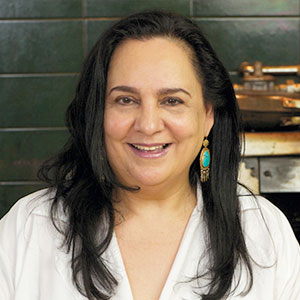
Najmieh Batmanglij
Today, Najmieh cooks, travels, and adapts authentic Persian recipes to tastes and techniques in the West.










